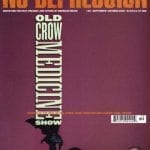A Trick of the Light
Until her records were finally reissued on CD this summer, there were essentially only two ways to hear Ronee Blakley’s music: a) hunt down the original LPs, or b) watch the movie Nashville. Which was astonishing, not only because Blakley’s voice — as a vocalist and songwriter — still sounds fresh after 30-odd years, but because she has one of the most storied showbiz resumes ever. Kevin Bacon may as well be a deaf mute cloistered in a Himalayan monastery by comparison.
Raised in Caldwell, Idaho, Blakley began performing in church as a child. Even then, she attracted attention. “I was singing at the top of my lungs from before I remember,” she recalls today. “My mother apologized to the preacher, and tried to shut me up, but he said, ‘Let her be.'” Later, she studied music at Juilliard in New York; in the late ’60s, she improvised vocal parts for the First Moog Quartet by electronic music pioneer Gershon Kingsley.
In 1972, Blakley, then in Los Angeles, released her self-titled Elektra debut. Featuring musicians recommended by Joni Mitchell, and backing vocals by another friend, Linda Ronstadt, the album hewed closer to classic country than similar singer-songwriter offerings of the era, yet also incorporated gospel and blues. Lyrically, songs such as “Dues” introduced a fiercely independent voice. Reinforcing that free-spirited character, Blakley wrote, arranged, sang, and played piano on all ten tracks.
After Blakley created the role of ailing superstar Barbara Jean in Robert Altman’s 1975 film Nashville, her stock skyrocketed. The virtual unknown earned an Academy Award nomination, in a performance that featured many of her original compositions. But in public, reconciling the fictional character and the real woman behind her proved slippery. “I would be asked, as Ronee Blakley, to be Barbara Jean…to wear the wig and dress on television shows,” she says. She declined.
That same year, Warner Bros. put out her sophomore album, Welcome. The record was cut at Alabama’s historic Muscle Shoals studios, a site Blakley remembers as magical. “It even had a fragrance: honeysuckle. And the air was soft. It caressed your skin, like a cotton ball. Softer than cotton.”
At the eleventh hour, she had a dispute with producer Jerry Wexler; he returned to New York, leaving her to finish alone. The two eventually made peace, and Welcome was released. During the promotional rounds, she appeared on Howard Cosell’s network TV talk show, rounding out an unlikely trio with Muhammad Ali (“I took his arm when we walked offstage, and it was like holding on to a tree”) and Evil Knievel. “Afterward, we all hung out and drank scotch,” which Knievel dispensed from a decanter concealed in his trademark cane.
Also in 1975, Blakley participated in Bob Dylan’s Rolling Thunder Revue, playing his vocal foil on “Hurricane” (which she later recorded with him on his album Desire). “I learned a lot from Bob, about greatness, and about maintaining,” she says. To stay cool, Dylan kept much of his entourage at arms distance — but not Blakley. “I remember saying to Mick Ronson once, ‘Don’t you just love Bob?’ And Mick said, ‘I don’t know, he’s never spoken to me.'”
But then Blakley let the momentum subside. “I should have gone back into the studio right away,” she admits. “But disputes happen, and feelings get rubbed the wrong way, and sometimes that can take a toll.” She lent her gifts to others’ projects. She co-starred in an off-Broadway musical with Tammy Grimes, Sunset, that closed after one performance; sang on Leonard Cohen’s Death Of A Ladies’ Man; scored and appeared in Lightning Over Water, a 1980 documentary by her then-husband, filmmaker Wim Wenders; and portrayed an alcoholic, overprotective mother in Wes Craven’s original Nightmare On Elm Street (featuring adolescent newcomer Johnny Depp).
Parenting and health problems preoccupied Blakley during the tail end of the millennium. Yet her music, despite its relative obscurity, exerted a pull on emerging artists. John Wesley Harding recruited her to sing and play on “Anonymous 1916” for his 1991 release The Name Above The Title. More recently, Carolyn Mark, Neko Case, Kelly Hogan and the Sadies’ Dallas Good recorded her songs for the concept disc A Tribute To Nashville.
Today, Blakley is poised to capitalize on renewed interest in her work. She plans to release her rarely-seen film, the 1985 “docu-drama” I Played It For You, on DVD, along with a companion soundtrack CD. She has enough material stockpiled for several new albums; a spoken word disc is the first project she hopes to complete. At the conclusion of our interview, she recited the lyrics of one new song, then performed another, in its entirety, at the piano. Rest assured, her insights and abilities have only deepened with age.
“One really hopes to just be able to keep creating, and that there is an audience,” she concludes. “But even if there isn’t, one still creates. You don’t stop.”




